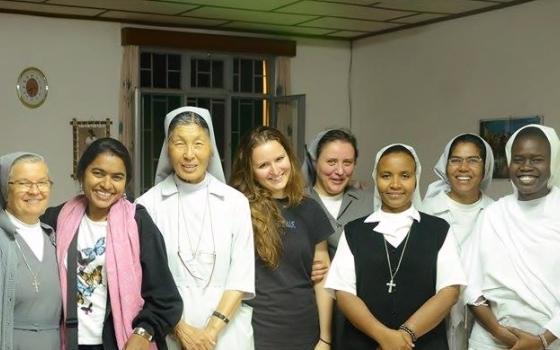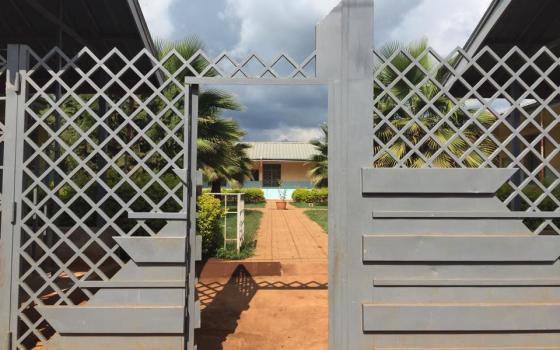Notes from the Field is GSR’s summer blogging project. Working with the Catholic Volunteer Network, we’ve enlisted four young women working in ministries of Catholic sisters around the world – Honduras, Thailand, Ethiopia and the United States – to blog about their experiences, each for six weeks. This is Angela Mahoney's final post.
______
Child after child line up in a row . . .
Parents are whispering prayers . . .
Sr. Agnese Lee takes the folded paper the child just drew from the bucket. It is blank. The 4-year-old child’s eyes fill up with tears and he lets out a wail.
This is my first experience of the registration process for the sisters' kindergarten. In a bucket there are 40 pieces of paper with a stamp on it, and the rest are blank. In the sister’s compound children are crowding in to draw to see if they can attend the sister’s kindergarten.
It is difficult for the sisters to see the disappointment from the children and parents who get a blank paper. Some sisters don’t even want to be around during the registration process. But this process is the only one they say that works. There are too many children who want to attend and not enough space for everyone. Moreover, if the registration is private they get accused of favoritism, so the registration takes place outside in front of everyone.
The sisters have two kindergartens. One kindergarten is in their compound, and the other one is in the other side of town. The kindergarten costs $20 a year per child, but the sisters are known to waive the school fee for the families who truly can’t afford it. Since the cost of tuition is so minimal, the sisters have to rely heavily on donors to help cover the expenses of the school: teachers’ salary, watch guards, supplies, electricity, children’s snacks, etc.
The sisters also have an adoption program. This is a program that allows someone to donate money to a child for his/her school fee, uniform, books and other food and clothing that the sisters distribute to the “adopted” child three to four times throughout the year.
The clinic that is run by the sisters here is free to the students, workers and family of the workers of the sisters. Many poor people who can’t pay also get their fee waived. Hence, the clinic also relies on donations.
The clinic is known for its non-surgical treatment for kidney stones. Many come from far to see Sr. Corazon, the doctor of the clinic, to get treated. The clinic also provides injections, ultrasounds, ER treatment and medicines to the locals. Before the clinic opens in the morning, Sr. Corazon gives a short talk on health and hygiene. It is important for the locals to understand how to take care of themselves, and even the basic concepts on health and hygiene needs to be explained.
Many people come to the clinic with very bad infections in their wounds. Usually the infection has been there a while before they actually decide to come and get help. Usually they try to fix the problem on their own first by using old “remedies” that sometimes only make the infection worse. Once the nurses have cleaned and bandaged the wound, they really have to stress the importance of keeping the injury clean. Many times the nurses have to clean the wounds repeatedly when patients don’t make cleanliness their priority.
Toenail clippers and underwear are two items that the volunteer from the clinic observed were really needed here. Children get infections on their toes from lack of care given to their feet, and underwear is commonly lacking among patients.
The clinic also offers vaccines. The rabies vaccine is a vaccine that is given often here. It is common to see animals roaming the streets, and if one bites a person that person comes to the clinic to get the series of injections for rabies. Whenever I’m out with the volunteer from the clinic, she always makes me circle widely around the many donkeys in the road since she has had to inject too many people on account of them.
As you can see, a mission has many services it offers to the locals of the area. But it doesn’t take an army to run a mission; it just takes a few hardworking sisters.
Here in Ethiopia, each sister has a role in the mission. Sr. Ana and Sr. Celine manage the two kindergartens. Sr. Corazon manages the clinic. Sr. Netsanet is in charge of the college. Sr. Linda helps with the chores of the house and is a student, and Sr. Agnese, with Sr. Helena’s help, manages the mission’s details, such as payments and administration. Each sister does her part to keep the mission working smoothly and effectively, and this is how a small group of sisters can keep an entire mission running.
[Angela Mahoney is a VIDES volunteer in Ethiopia. She is there teaching Communications and English, and on Sundays she helps the sisters with the Oratory for children.]



